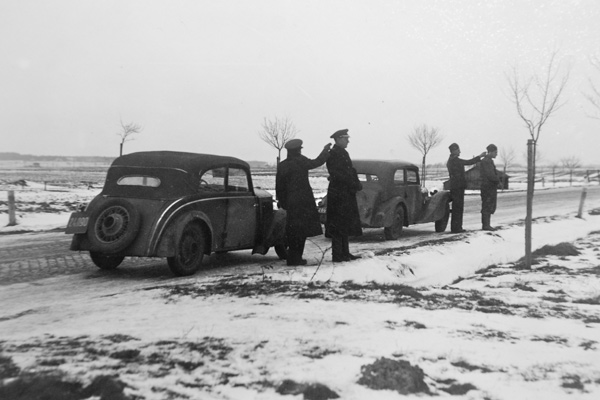The scene is chilling. Four men stand in the snow, all in uniform. The men are in pairs, one in each pair holds a pistol to the head of the man in front. Behind them two parked cars, 1940s models; in front a snow-filled ditch. What happens next?
The right answer depends on which scene you are watching. The one reproduced in both these books (and above) occurred in February 1946, and was a reconstruction staged by RAF police hunting for the killers of two men, Flying Officer Gordon Kidder and Squadron Leader Thomas Kirby-Green. Afterwards, all four participants and the man who took the picture got back in the cars and drove off. In the original scene, which had taken place two years earlier, there was no photographer. Two men toppled forward into the ditch and only their killers returned to the cars.
The facts that led to the murders were simple enough. A week before their deaths, the two officers were among 76 prisoners- of-war who had escaped through a tunnel from the camp, Stalag Luft III, where they were being held; just three of them made it back to Britain, and 23 more were returned to captivity.
There had been other mass escapes, notably by 43 Polish officers from a camp in 1943. What made the one from Stalag Luft III different was Hitler’s enraged reaction, ordering that all those recaptured be shot, and only modifying the number to a maximum of 50 after being warned that the crime could not be concealed.
A constant regression affects every account of the Great Escape. First came the event, then the investigation into the mass execution, next the stiff-lipped heroism of Paul Brickhill’s book that gave it its name, followed by a dozen others in similar vein, and, skewing the view irredeemably, the motor-biking romance of Steve McQueen’s 1963 film. Each new approach must, like these two books, attempt to find a fresh perspective to retell a familiar story. Simon Read’s Human Game concentrates on the murder investigation, while Guy Walters in The Real Great Escape more ambitiously sets out to ‘strip back all those layers of varnish’ to find out what really happened.
The starting-point of both books is the dominant personality of the escape’s mastermind, known as ‘Big X’, Squadron Leader Roger Bushell. In civilian life he was a barrister and, to judge by a photograph of him sporting a louche trilby, loud check jacket, a rifle slung over his shoulder and the appraising stare of a sexual predator, not the kind that plays by the rules. Nevertheless, by sheer force of personality he persuaded scores of equally strong-minded characters to accept the ambitious scope of his plan with its large number of escapers ‘so that we can make life hell for the Hun’.
With commendable pertinacity, Walters has ferreted out original accounts from diaries, photographs and documents. These sources add valuable detail to the well-known narrative of the tunnelling, the careful concealment of the entrance beneath a stove, the makeshift air-pump, the disposal of the tell-tale yellow sand, the distraction and corruption of guards, and eventually the scrambled, claustrophobic burrowing through the dark to freedom.
But inexplicably Walters deploys his material to demonstrate that Bushell’s plan was ‘an act of reckless, counter-productive bravado’ that should never have been attempted because it was doomed to failure. His health-and-safety disapproval not only makes dismal reading, but is self-defeating — because what evokes our admiration is precisely the readiness of the escapers to risk their lives rather than sit safely behind the wire.
Human Game is more satisfying because it avoids making judgments based on hindsight. The achievements of its protagonists, a former policeman, Flight Sergeant Frank McKenna, and Wing Commander Freddie Bowes, in tracking down 61 of the 72 Germans complicit in the execution of the escapers, including the killers of Kidder and Kirby-Green, are admirable in themselves. A pity then that they should have been presented in a faux-Chandleresque style of hissed breath and narrowed eyes that makes one doubt the veracity of the account. The Great Escape regression will no doubt continue into the 70th anniversary next year, but it is yielding ever smaller dividends.






Comments